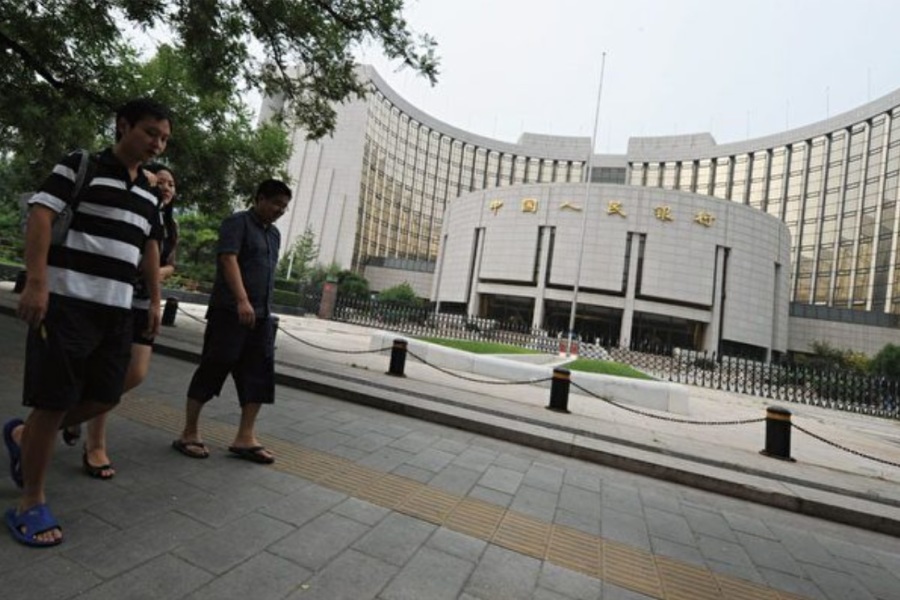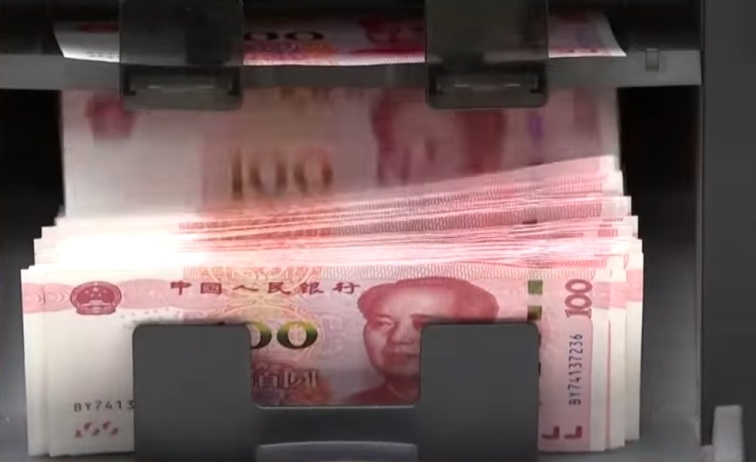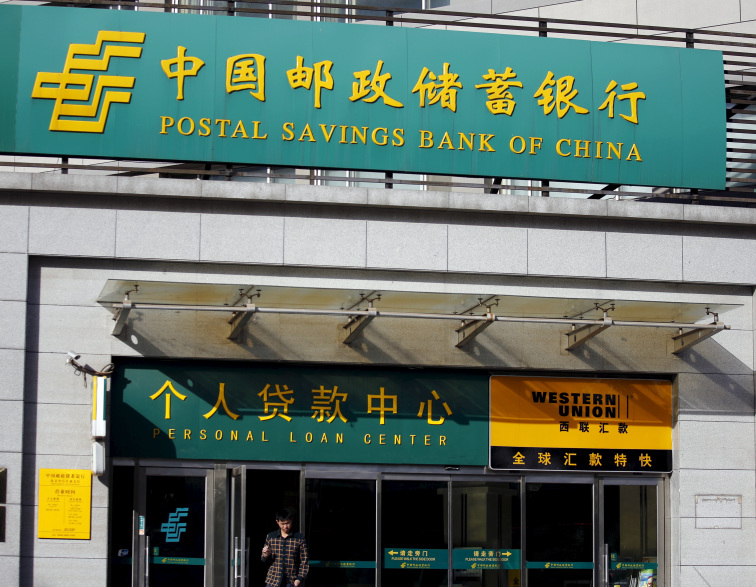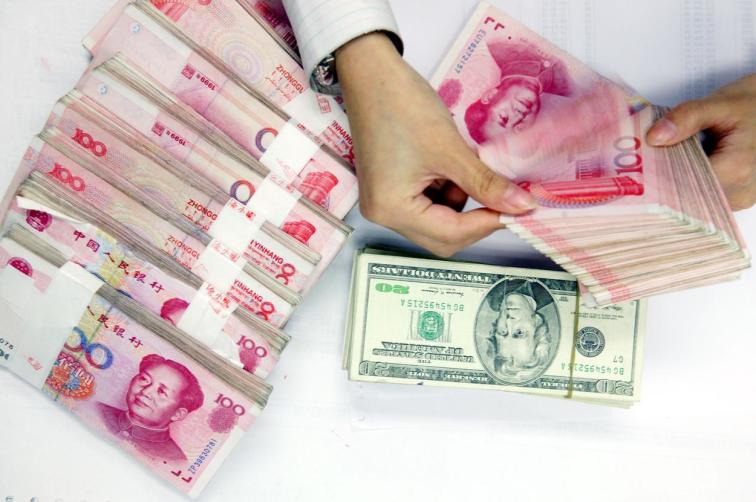A group of citizens passes by a branch of the People's Bank of China (screenshot from X/@dujuncn)
[People News] China Merchants Bank (CMB) recently trended online due to the topic “average salary dropping below 600,000 yuan.” Some call this dark humor—despite the pay cuts, CMB salaries still tower like skyscrapers in the desert of economic decline, standing galaxies away from the financial slums of ordinary people. Is this really a salary cut? Or is it the financial elite flaunting their triumphant survival in the battle of economic deflation?
Indeed, in China’s financial system, monthly salaries of 80,000 to 100,000 yuan are common, a stark contrast to the meager 4,000 to 5,000 yuan earned by the average worker. Many ordinary citizens lament that they would rather not be born in China in their next life. However, this round of salary cuts at CMB sends a different message. Not all financial industry jobs pay sky-high wages—some positions now offer monthly salaries in the four-digit range. Frontline bank tellers make around 8,000 yuan per month, while compliance specialists earn as little as 5,000 yuan, barely above the wages of janitorial staff.
The concept of "average salary" is misleading—it's like averaging your income with Jack Ma’s. What truly matters is how much top executives' salaries have been reduced. The president of CMB saw a 500,000 yuan cut in his annual salary for 2024, a 14% decrease from the previous year and a 23% drop compared to 2022. As a model bank in China’s financial system, CMB’s pay cuts signal deeper troubles ahead. Looking at the broader financial landscape, even the glittering financial empire is crumbling under this prolonged economic downturn. In July 2024, a 30-something-year-old female employee at China International Capital Corporation (CICC) tragically jumped to her death—not over a failed trade, but because of salary cuts. When an avalanche occurs, no snowflake is spared.
CMB’s Salary Cuts: A Warning of Systemic Financial Risk
CMB is known for its retail banking business, yet its 2024 financial report, released on March 25, shows a pre-tax retail profit of 90.644 billion yuan, a 9.28% year-on-year decline. Among its 210 million retail customers, only 5.24 million are "Gold Sunflower" (high-net-worth) clients, making up less than 2.5%. Meanwhile, CMB’s credit card transaction volume in 2024 was 4.42 trillion yuan, down 8.23% year-on-year. The bank is losing its traditional competitive edge, and its profitability is clearly weakening.
Non-interest income has also taken a hit. Net fee and commission income was 72.094 billion yuan, down 14.28% year-on-year. Wealth management fees saw the steepest drop, declining by 22.7% to 22.005 billion yuan. Other fee-based revenues also plummeted—bank card fees fell 14.16%, loan commitment and credit commission fees declined 15.57%, and custodial fees dropped 8.2%.
Interest income, the lifeblood of Chinese banks, has also taken a downturn. CMB’s net interest margin fell from 2.15% in 2023 to 1.98% in 2024, with net interest income declining 1.58% year-on-year. Its net interest spread shrank from 2.03% to 1.86%, nearing the critical 1.8% warning level for Chinese banks. China’s banking sector primarily relies on interest income, but with the real estate market in a slump and employment rates declining, demand for mortgages and consumer loans has weakened, structurally damaging the banks' profit models and planting the seeds of financial risk.
In 2024, CMB’s net profit growth hit a 12-year low, dropping by 5 percentage points from the previous year's 6.22% growth.
This isn't just about banks—salary cuts have swept across the entire financial industry. At top investment bank CICC, average salaries have been slashed by half in three years, now standing at just 500,000 yuan. Zhongyuan Securities' average employee salary in 2024 was 272,500 yuan, an 18.65% drop year-on-year, marking its third consecutive year of decline. At CITIC Securities, total executive compensation plummeted by 69% to 28.75 million yuan in 2024. Huatai Securities and Guotai Junan also saw their executive pay drop by 53.35% and 49.64%, respectively.
The asset management sector has entered its darkest hour as well. Fund managers who once earned 15 million yuan a year are now making just 1.2 million yuan—a brutal cut that leaves them clinging to the remnants of their former wealth. In 2024 alone, 359 fund managers resigned, the highest number on record. The trust industry is also deteriorating, with major state-owned trust companies slashing executive salaries by 50%, mid-level salaries by 30%, and junior employees' pay by 5–10%.
The Financial Sector Struggles to Remain Unaffected Amid the Economic Downturn
In 2024, the six major banks in China's banking industry—Agricultural Bank of China (Nongye Yinhang), Bank of Communications (Jiaotong Yinhang), Industrial and Commercial Bank of China (Gongshang Yinhang), Postal Savings Bank of China (Youzheng Yinhang), China Construction Bank (Jianshe Yinhang), and Bank of China (Zhongguo Yinhang)—experienced a continued decline in their net interest margins compared to the previous year, with figures of 1.42%, 1.27%, 1.42%, 1.87%, 1.51%, and 1.40%, respectively. Five of these banks have crossed the warning threshold, while Postal Savings Bank is closely trailing behind, approaching the warning line. All six banks have faltered in what has been termed the interest margin defense battle, resembling aircraft carriers aligning with submarines, and it appears that this downturn may not recover.
Reports from mainland media indicate that a review of the 2024 financial statements reveals a continued slowdown in the overall revenue growth of the six major state-owned banks. The revenues of Industrial and Commercial Bank of China and China Construction Bank have declined for the third consecutive year in 2024, with year-on-year decreases of 2.5% and 2.54%, respectively. In the two preceding years, Industrial and Commercial Bank's revenues fell by 3.73% and 2.63%, while China Construction Bank saw reductions of 1.79% and 0.22%. Since 2021, Postal Savings Bank has been experiencing a steady decline in revenue growth, reporting a rate of 1.83% in 2024. The revenue drops for both Industrial and Commercial Bank and China Construction Bank are attributed to a decrease in interest income.
While bank revenues and profits are contracting, non-performing loans are on the rise. According to a report by Securities Times, in 2024, commercial banks have accelerated the clearance of non-performing loans, with the scale of non-performing assets disposed of through methods such as public transfer reaching a historic high. The transaction volume of non-performing loan transfers in 2024 exceeded 220 billion yuan, marking an 80% increase year-on-year.
In 2024, the proportion of personal non-performing loan transfers among various financial institutions remains notably high within the total transaction volume. The total amount of personal non-performing loans transacted throughout the year reached 158.35 billion yuan, marking a 64% increase compared to the previous year, and accounting for nearly 70% of the total non-performing loan transactions. Data from the fourth quarter of 2024 shows that personal non-performing consumer loans had the highest share at 66%, followed by personal non-performing business loans and credit card overdrafts.
The Communist Party of China has presented the transfer of non-performing loans as a success in reducing the non-performing loan ratios of state-owned banks. However, this narrative seems somewhat misleading, as the increase in non-performing loan transfers actually indicates a rise in the scale of non-performing loans themselves. Moreover, who is actually taking on these so-called non-performing loans? It is primarily local state-owned enterprises that are stepping in. How are they planning to resolve these bad debts? There are three main strategies: first, employing 'debt collectors' to pressure debtors; have you noticed how sought-after senior debt collector positions have become in 2024? The second strategy involves repackaging these bad debts using various flashy techniques before selling them off, perpetuating a Ponzi scheme; whoever takes over will ultimately face the consequences. The third strategy is that since local state-owned enterprises are acquiring the banks' non-performing loans, if they cannot resolve these issues, the fiscal deficit will cover the losses, leaving the entire population to bear the costs.
Confronted With the Communist Party's Heavy-handed Policies, the Financial Industry is Facing Even Greater Challenges
The harsh winter for the financial sector is attributed to both the freezing economic environment and the intimidating impact of the Communist Party's stringent policies.
To revive the struggling zombie economy, particularly to stimulate the real estate market, the Chinese Communist Party (CCP) plans to lower interest rates on existing housing loans and adjust the Loan Prime Rate (LPR) in 2024, which will exert downward pressure on asset yields. In 2025, in an effort to boost consumption, major banks are enticing the public to take out consumer loans, with the loan limits set between 300,000 and 500,000 yuan. This approach is unpopular; the public is criticizing the Communist Party for opting to issue loans instead of cash or vouchers, while banks are concerned about the risk of not being able to recover these loans.
Salary cuts in the financial sector are part of the CCP's common prosperity initiative. An annual report from China Merchants Bank reveals that 0.06% of the wealthy in China control 31% of the nation's wealth, while 1.9% of the middle class hold 51.12% of the wealth. In contrast, the largest group, comprising 98% of ordinary citizens, possesses only 17.85% of the wealth.
The financial industry is regarded as the most prestigious sector in the domestic job market. For instance, at China International Capital Corporation (CICC), the average monthly salary for regular employees is 100,000 yuan. In 2020, the total compensation (before tax) for CICC's directors and supervisors amounted to 168 million yuan, with seven individuals earning over 10 million yuan annually before tax. A report by China Economic Weekly indicates that from 2018 to 2021, the average annual salary for employees in the financial sector was 2.35 times higher than that of the manufacturing industry and 1.69 times higher than that of other sectors. The securities industry is particularly notable, with employees earning an average annual salary during the same period that was 3.76 times that of the manufacturing sector and 2.71 times that of other industries.
In China, 600 million people earn less than 1,000 yuan a month, and with the economy on a downward trend, the Chinese Communist Party (CCP) has found a convenient excuse. Why not target the wealthy to assist the poor? Since February, the CCP has implemented salary caps for financial state-owned enterprises, stipulating that the annual salary of group employees cannot exceed 1 million yuan. As reported by Caixin, this salary reduction affects 27 financial state-owned enterprises, including the three major policy banks, the five largest state-owned commercial banks, six insurance companies, four asset management companies, the China Investment Corporation, and their subsidiaries.
The CCP has dismantled the financial workers' so-called 'Versailles gold bricks,' all while claiming to promote common prosperity. However, the CCP only targets the rich without providing support for the poor, resulting in widespread displays of loyalty and sparks of dissent across the country. The CCP continues to ignore the situation, increasing farmers' monthly pensions by a mere 20 yuan, while it is determined to unify Taiwan by force. To this end, it aims to establish a strong manufacturing nation, aggressively building powerful ships and artillery, with military spending growing at a rate of 7.2%. Is this what they call common prosperity? This is a trend towards common poverty, shared despair, and collective sacrifice.
(This was first published by the People News)










News magazine bootstrap themes!
I like this themes, fast loading and look profesional
Thank you Carlos!
You're welcome!
Please support me with give positive rating!
Yes Sure!